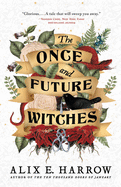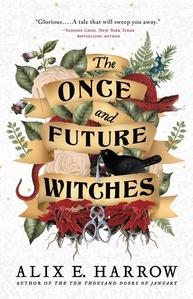
 Alix E. Harrow (The Ten Thousand Doors of January) enters the ranks of the growing feminist witch genre with The Once and Future Witches, an expansive, angry and ultimately hopeful historical fantasy novel. Focused on three white sisters and including a diverse cast of secondary characters, this story takes place in an alternate-history 1893 New Salem, 200 years after the (fictional) complete destruction of Salem.
Alix E. Harrow (The Ten Thousand Doors of January) enters the ranks of the growing feminist witch genre with The Once and Future Witches, an expansive, angry and ultimately hopeful historical fantasy novel. Focused on three white sisters and including a diverse cast of secondary characters, this story takes place in an alternate-history 1893 New Salem, 200 years after the (fictional) complete destruction of Salem.
The initially estranged Eastwood sisters represent three archetypal witches and women: the Maiden, the Mother and the Crone, though Harrow makes clear that every woman is not just one thing. Eldest sister and librarian Bella is the Crone, often found researching spells and acting as the voice of reason. Pregnant middle sister Agnes is the Mother, at times hesitant to enter or continue the fight, worried about the immediate need to survive with and for her daughter. Much younger Juniper, half-feral and wildly optimistic, takes on the role of a warrior Maiden, coming to town after murdering the sisters' abusive father and immediately causing mayhem. She reunites the sisters at the beginning of the novel and remains the glue that holds them together.
Harrow's world-building is intricate, and the plot is full of smaller battles and acts of rebellion, but her protagonists are complex women with clear motivations. Like many other modern stories about witches, The Once and Future Witches deals heavily with feminist themes, including women's suffrage, sexual harassment and legal oppression, but Harrow also works to broaden the scope beyond white feminism. Harrow's diverse cast of secondary characters are working toward equity in other spheres, each with their own take on witching: the labor movement and unions, Black civil rights, sex work, and immigrant and LGBTQ+ experiences.
"These were women who were never tempted by the suffragists or their rallies or their high-minded editorials in the paper. Oh, they wanted the vote... but these were women who knew the difference between wanting and needing. The vote couldn't feed their children or shorten their shifts. It couldn't cure a fever or keep a husband faithful.... Maybe witching could."
As plague sweeps the city of New Salem, and its inhabitants are whipped into a witch-hunting frenzy by a powerful man and his moralizing allies, the stakes are raised ever higher, culminating in a battle that will have readers anxious to see if everything turns out all right. And though Harrow never pretends that change is immediate or easy, in the world she's created, witching is inside everyone, meaning that the power to affect change is within the grasp of all--if only we have the Will and the Ways. --Suzanne Krohn, editor, Love in Panels
Shelf Talker: Readers looking for a feminist alt-historical fantasy about reclaiming witchcraft and taking down the dominant power structures will be riveted.

